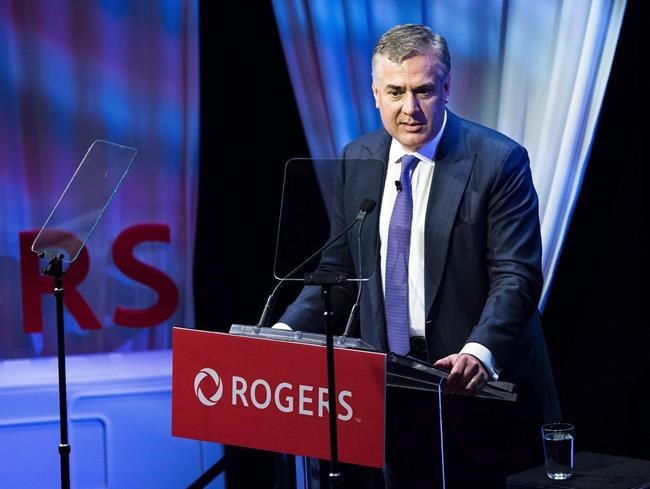The departure of Rogers Communications Inc. CEO Joe Natale raises further questions about the company's direction as it looks to put a boardroom power struggle behind it and focus on the acquisition of rival Shaw Communications, experts say.
In a statement late Tuesday, the telecommunications giant said Natale was out as CEO, and replaced in the interim by former chief financial officer Tony Staffieri as the board searches for a permanent chief executive to guide its $26-billion takeover of Shaw.
Staffieri is a candidate for the post, Rogers said.
Tyler Chamberlin, assistant professor at the University of Ottawa's Telfer School of Management, says the family feud over chairman Edward Rogers' attempt to replace Natale with Staffieri may be settled, but uncertainty at the top could have trickle-down effects at the company.Edward's mother Loretta Rogers and sisters Martha Rogers and Melinda Rogers-Hixon had fought the move.
"Are these folks going to continue to feud like that? Obviously that's not going to be good for the company, not good for shareholders and not good for the management team who's going to be taking over. And we'll be needing direction from the board," Chamberlin said.
Edward's initial attempt to oust Natale in favour of his No. 2 led instead to Staffieri's departure in September, as well as a board vote to push Edward from his seat at the head of the table.
Edward penned a shareholder resolution — without a shareholder meeting — to oust the five directors who had defied him. The company filed a legal challenge to his revamped board, sparking a court battle over who actually served on it.
On Nov. 5, a British Columbia Supreme Court judge ruled Edward's declaration legitimate.
"These family squabbles are an interesting backdrop to this dispute that would be more in keeping with a Shakespearean drama," Justice Shelley Fitzpatrick wrote in her decision.
Chamberlin said Natale's exit could lead to a fresh strategic direction following the company's lacklustre performance under the outgoing CEO.
"An underperforming CEO is being replaced by another executive. This happens all the time," he said.
"This isn't about some great scandal, this isn't about some great corruption. It's just about differences in strategic visions and who best should lead this very large, very valuable company."
RBC Dominion Securities Inc. analyst Drew McReynolds said he is looking out for further C-suite changes, but does not believe the executive turnover will impact the regulatory approval process for the Shaw deal.
Three federal agencies are reviewing the potential acquisition, with the country's telecom regulator slated to hold a hearing on Monday.
A narrowing of Canada's telecom landscape, already dominated by Rogers, Telus Corp. and BCE Inc., would reinforce the main providers' control over the market, said Carleton University communications professor Dwayne Winseck.
The Shaw acquisition would hand Rogers critical fibre-optic networks to boost its 5G capabilities and go head to head with Telus and Bell nationwide, Winseck said.
"Rogers doesn't have a lot of that out west. So the major play here really is not about the wireless stuff, it's about Rogers getting hold of fibre infrastructure."
Natale marks the third CEO to be shown the door in eight years, following Guy Laurence in 2016 and Nadir Mohamed in 2013.
Businesses with dual-class shares such as Rogers can be big profit generators, but the recent boardroom clash also points to the governance risk associated with that structure.
"There's effectively one person in charge of Rogers, and not just as the owner, but capable of dictating the direction of management," said Ben Klass, part of a research team studying ownership concentration in Canada’s telecom and media industries.
Companies with dual-class shares issue different sets of common shares that have different voting and control rights. This often gives one group of shareholders an outsized share of those rights, typically the firm's founders, family members or executives.
"The whole feud seems to have been about control. And when one of the people engaged in the feud controls 97 per cent of the company, I think it's fairly clear what's going to happen," Klass said.
This report by The Canadian Press was first published Nov. 17, 2021.
Companies in this story: (TSX:RCI.B, TSX:SJR.B, TSX:BCE, TSX:T, TSX:QBR.B, TSX:SHOP, TSX:GOOS, TSX:ATD.B, TSX:BBD.B, TSX:CTC.A, TSX:CTC)
Christopher Reynolds, The Canadian Press



